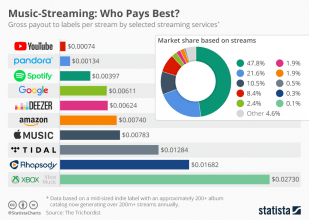
By Jeremy Pui, KCL Blockchain
Mycelia by Imogen Heap has sought to introduce a potential solution to provide content creators with greater protection, both financially and in regard to the distribution of their content rights. While this solution appears to be theoretically viable, there are certain barriers that might constrain the success of this avenue.
A dilemma in the industry?
Creative content is now more readily accessible and discoverable greater than ever before, and the way consumers interact with these products has become significantly more user-friendly due to the digitalisation of movies and music. Streaming companies such as Netflix or Spotify provide not only a more efficient method of storage and collection of media files, but the introduction of subscription-based services have also led to lower costs for regular consumers of these platforms.
However, while consumers may have gained a benefit, this has been established at a detriment to content producers. The circumstances of the music industry will be used as a case example.
It is estimated that the monetary return for established artists for 1 million streams on Spotify or Apple Music is significantly lower than the revenue from selling 1 million singles in the 1970s. This problem is exacerbated in the situation of those who are emerging or attempting to climb the ranks of the industry.
This problem has emerged as a result of centralised authorities such as these streaming platforms enjoying growth in their authority, and are therefore able to maintain larger bargaining power when it comes to the negotiation of terms with musicians. With an effective oligopoly in the market for digital music, artists have no choice but to accept the terms of these corporations for the opportunity to publicise their content. This makes it harder for creators to sustain themselves financially, which in turn limits their ability to continue to produce new material. This cycle creates a high barrier to entry for aspiring mainstream artists due to the overwhelming disincentives.

How can blockchain provide a solution?
In an attempt to correct this issue and restore the balance of power in favour of the creative community, the Mycelia platform was created by Imogen Heap, establishing a means by which artists can distribute and take greater control over their content.
Mycelia makes use of smart contracts on the Ethereum blockchain to allow musicians to sell and license their music, peer-to-peer. They are able to set their own price, and the transfer of money by users instantly triggers a download of the listed material.
As a consequence, there are two key benefits on the part of both the producer and the consumer. The first mutual benefit is in respect to pricing. Due to the fact that no intermediary exists in the transaction, it is highly likely that producers will be able to charge lower prices while still earning a larger stake for themselves, which leads to greater financial stability. This is because no fees have to be paid to any middlemen, such as a record label or streaming platform. Therefore, the money paid by the consumer is owned entirely by the artist at the point of transaction, at which point the creator would be able to redistribute fractions of the sum to relevant parties involved, such as contributing musicians or songwriters.
The second benefit is a subsequent notion that these content creators have greater ownership over their output. The absence or limitation of bureaucracy means they can make decisions more independently on the structure of licensing or distribution. For example, an artist may be able to develop different clauses corresponding to different prices in the smart contract depending on whether the song would be used for recreational purposes, as a soundtrack for a film or other uses.

An assessment of this solution’s practicality
Ultimately, while Mycelia seems to provide a robust answer to the aforementioned problems of the music industry and beyond, it is uncertain as to whether or not this solution is practical in nature.
A culture of dominance by mainstream music and other content producers means that consumers will tend to follow the source of big names in the field. In order to drive adoption of blockchain technology for the transactions as proposed by Mycelia, there is a requisite of Top 40 artists and others with significant followings to promote and endorse the use of such a platform. Without this, it is unfortunately unlikely that the industry will make the transition to a decentralised environment as consumers will not recognise the potential or merit to changing their habits. This is the barrier this technology will need to overcome to begin a true revolution for content rights distribution.

Founder Dinis Guarda
IntelligentHQ Your New Business Network.
IntelligentHQ is a Business network and an expert source for finance, capital markets and intelligence for thousands of global business professionals, startups, and companies.
We exist at the point of intersection between technology, social media, finance and innovation.
IntelligentHQ leverages innovation and scale of social digital technology, analytics, news, and distribution to create an unparalleled, full digital medium and social business networks spectrum.
IntelligentHQ is working hard, to become a trusted, and indispensable source of business news and analytics, within financial services and its associated supply chains and ecosystems



























